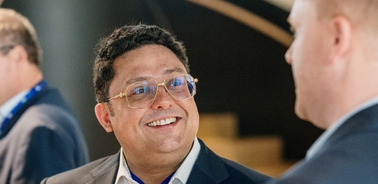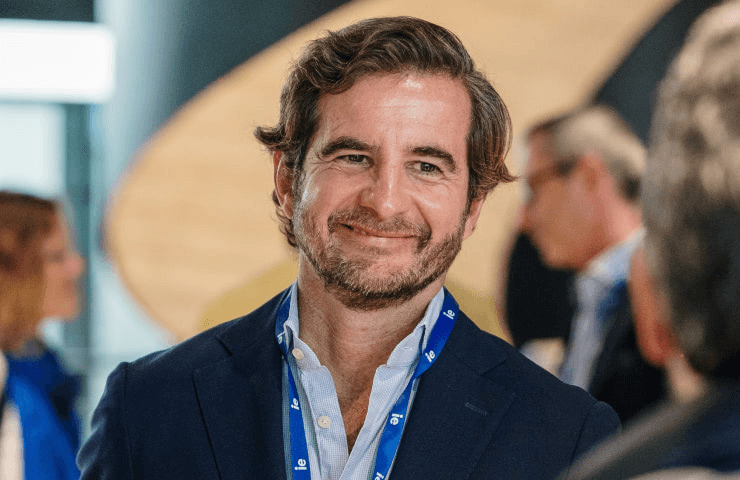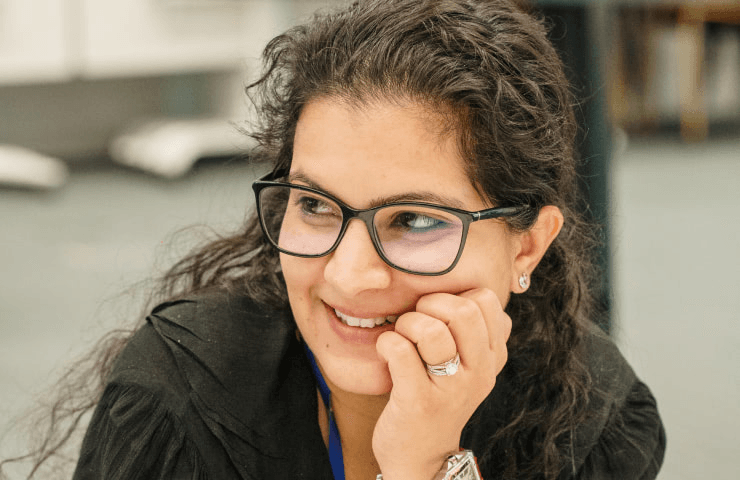- Home
- News & Events
- News
- Success, Leadership And Impact: Conversations With Ie Alumni
Success, Leadership and Impact: Conversations with IE Alumni

What does success look like? Is there a universal type of effective leadership?
From being a global director at a top multinational to leading the fastest-growing multi-cloud data protection company and even combining a high-profile position with a dedication to academia, our IE Alumni paint a boundless portrait of success.
Although all highly successful, Sakhee Joisher, Simon Taylor and Manuel Álvarez de la Gala have their own definition of the concept. Conversations with them revealed the keys to effective leadership, the nuances of success, and how IE marked each of their journeys.
The Measure of Success
Simon Taylor is the CEO and founder of HYCU, the fastest growing multicloud and SaaS data protection company. He studied the International MBA at IE in 2010 and has more than 20 years of experience in go-to-market strategy development, product marketing and channel sales management for the tech industry.
His company is operating in the ever-evolving data protection landscape, which has also been impacted by this new age of AI. He highlighted the importance of being highly aware of where your data is, and dedicating resources to data recovery in addition to cybersecurity.
“We need to stop focusing cyber security around building the walls higher and keeping the bad people out because there's more of them than there are of you,” said Taylor, “We need to imagine what happens when they break in the door and know what tools you need to recover the data.”
As a thriving entrepreneur, for him, success is all about freedom.
“My measure of success is not money. It's not wealth. I don't have a number, that I'm magically waiting for,” said Taylor. “Success is being able to do whatever you want to do, whenever you want to do it, without hurting anybody else. And I think the extent to which we can live our life doing that, we're successful.”
Sakhee Joisher, Global MFC Director at Glovo, has a complementary perspective. She studied the Masters in Finance at IE in 2008, has had a career across the finance and consulting industries in client-facing roles and is now working in a consumer facing business.
Working in a highly competitive environment as is the delivery industry, she is an expert in customer experience and understands the nuances of factors like speed or UX/UI in meeting and exceeding customer expectations.
“I would say that speed was the buzzword during the pandemic, when everyone was stuck at home and struggling to get items into the house,” said Joisher, “But to be honest, I think that is not the case any longer. Now speed has been replaced with `is the order on time? ´ If I said the order was going to come in 15 or 20 minutes, do I deliver in that time frame?”
Her view on success, as a mother and accomplished professional, is somewhat different to Taylor’s. For her, success is all about impact.
“For me, undoubtedly it's impact, and that doesn't necessarily mean financial impact,” said Joisher, “It can mean impact from a society point of view, it can be impact on a specific person. I think for me, it's not what you do is what the outcome of what you do is.”
Manuel Álvarez de Gala, Global Business Managing Director at Havas, has a similar view to Joisher. He studied the Senior Management Program at IE Business School in 2021 and has also been an associate professor at IE for the past 17 years.
He works in an industry that was previously dominated by creativity and is now incorporating data-driven decisions. Navigating that wave of change requires someone with his level of expertise and optimism toward innovation.
“I’m always telling my teams that we need 80% of the decisions to be based on data, but 20% on intuition,” said Álvarez, “So the idea is we can provide a combination between data and AI and at the same time intuition because we are human, and that human insight is what will ultimately differentiate what you do.”
As a successful professional also working in academia, he weaves his purpose across the personal and professional realms of his life. Similarly to Joisher, the success of that purpose is measured through positive impact.
“Everything that I do is based on my purpose,” said Álvarez, “I'm having a positive impact in my work, with my family, with my friends, in this environment, in this world, supporting people that need something. Positive impact is the metric that I use for my purpose.”
Freedom, impact and purpose are three different lenses through which to view success per our thriving IE Alumni. Something they all have in common, though, is that they are great leaders.
The 5 Keys to Exceptional Leadership
#1: Lead with Purpose and Treat Failure as the First Learning
Manuel Álvarez de Gala emphasized the importance of living with purpose and aligning it across the personal and professional realms, connecting ourselves with the purpose of the company as a whole.
Equally positive in nature, he delved into the concept of failure and underscored the need to treat it as part of the path toward success.
“I like the concept that failing today is the first learning, as when you change the meaning of failure, you see things from a new perspective,” said Álvarez, “For example, in my team, I always dedicate 10% of the budget to experiment new things that entail risk of failure.”
Building on this concept of failure, Simon Taylor explained the key to overcoming challenging situations.
#2: Hire People Better than You and Be Honest with Your Team
On the topic of dealing with challenges, Taylor acknowledged that some leaders may feel the urge to downplay the gravity of a situation to avoid alarming the team and portray an unwavering image of poise and control.
However, he emphasized the need to hire the best team possible and trust that they will be equipped to help solve a challenge or crisis.
“I will never hire a senior executive who works for me, who isn't better than me,” said Taylor, “And in times of crisis, you owe it to them to give them full honesty and transparency. You need to have trust and faith that the team you put in place is going to be able to help you solve those big problems, and when you do that, you have great, great results.”
#3: Set and Live Authentic Company Values
Another piece of advice from Simon Taylor, he discerned the nuances of company culture and delved into the popular concept of company values, discriminating between those set by an isolated marketing team, and those implemented and embodied by the founders and top leaders.
“At HYCU, we sat around the table as a team and we said, what are the three things that actually enable HYCU to be successful?” said Taylor, “And the three core values for us are authenticity, grit, and empathy. We call it better with AGE.”
Beyond the creation of authentic values, he stressed the importance of living and implementing them into the hiring process and work life, for example, through a system of awards.
#4: You Cannot and Should Not Aim to Have It All:
Equally important to think in broad terms when reflecting on your purpose or company culture, is the ability to set honest expectations about what you can and cannot achieve, as Sakhee Joisher wisely reflected.
She explained how, as a woman and especially a mother in the finance industry, it is easy to strive for unreal perfection in fulfilling personal and professional responsibilities, which can cause frustration when those expectations are not met.
“I think the idea is not to scare anyone, it's not to say to others don't aspire for leadership roles; I think we can do it, and I think we should definitely aim high,” said Joisher, “But I think the idea is you need to prioritize certain things and be realistic that there are tradeoffs at different points in your career, because if you try and do everything, you will look back and feel like you failed at everything.”
Her advice was directed not only at women, but at all professionals who struggle with work-life balance. Equally important to setting expectations with yourself, Joisher emphasized, is setting clear expectations and boundaries with others.
“The way I manage that is by being extremely transparent about what I need and, and how it's going to work for me,” said Joisher, “I explain what flexibility I need, such as these are the hours when I’m unavailable, because that's when I dedicate time to my children. But flexibility comes with open communication with your manager, to let them know that you're still going to deliver on what you've been asked for.”
#5: Earn Your Seat:
The final piece of advice from Simon Taylor, as CEO and founder of a successful business, is what he describes as earning your seat.
He underlined the importance of bringing your full self to the table in order to leverage your team’s full potential.
“If you can't bring your full self to the table you can't allow your employees and the people who work with you to tell you that you're wrong, to express themselves in a way that is natural for them,” said Taylor, “What ends up happening is you're only bringing 10 to 20% of that person's full capacity to bear on your business.”
He further underscored the importance of keeping up with the industry and constantly optimizing the skills needed to run a business in an ever-changing landscape technological and business landscape.
Bonus: The Importance of Relying on a Community:
Each of our alumni gave special pieces of advice, but what they all had in common was their emphasis on keeping close ties with a community. In their case, the IE community was a network they highly cherished.
“My MBA class from 2011 still maintains a WhatsApp channel where all of us communicate,” said Taylor, “We share birthdays and holidays, and it's so wonderful to see how successful the entire cadre of students has become, and I am constantly in awe of the work that they're all doing.”
Joisher, who recently returned to Madrid to work, agreed.
“To be honest, it's been really important for me to keep close ties with the community since I've come back to Madrid,” she said, “I would say a system can provide if you're ready to take from it. When I first arrived in Madrid, I spoke to the IE Alumni Team about different job opportunities, and since have still kept in touch about different events and trainings."
As part of the IE alumni and faculty communities, Álvarez praised the impact-driven culture of IE’s network.
“We all have different profiles, but also have the same motivation or the same values,” said Álvarez, “So part of the culture of IE is this concept of community network, but going beyond the business benefits, how can we have a good impact in the work to provide to the next generation.”
IE Global Alumni is dedicated to sustaining and expanding meaningful and valuable connections that IE Alumni can leverage during their professional and personal lives.

